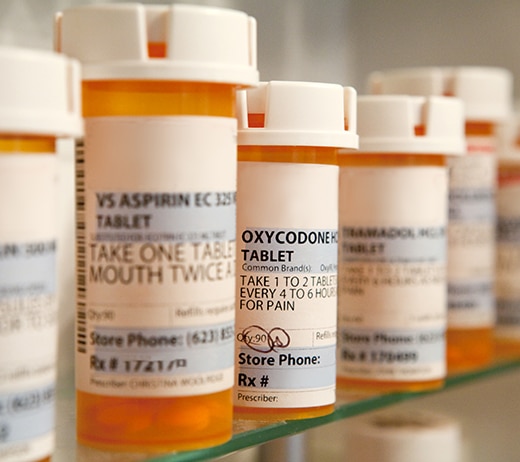
Formidable Texas Pharmaceutical Negligence Attorneys
Legal help for victims of prescription drug injury in Austin, Fort Worth, and Dallas
Medical malpractice can be deadly to patients, but another lesser-known form of malpractice – pharmaceutical negligence – also leads to many injuries and fatalities each year. Doctors and pharmacists prescribe and fill the medications necessary to keep patients healthy and treat their conditions. These medications may be dispensed as pills, liquids, IVs, or injections.
When a pharmacist makes a mistake, however, patients can suffer severe or fatal consequences. All medical professionals have a duty to provide competent care, including dispensing the correct medication in the correct dosage. If they fail in this duty and harm a patient, they can be held responsible for negligence and malpractice. The Texas attorneys at Slack Davis Sanger can help if you or a loved one were injured by pharmaceutical negligence.
Involved in an Accident?
We're Ready to Help
What is a medication error?
The U.S. Food & Drug Administration (FDA) discusses medication errors in the context of patient injury, defining them as “any preventable event that may cause or lead to inappropriate medication use or patient harm while the medication is in the control of the healthcare professional, patient, or consumer.” They also report results of medication errors can include hospitalization, disability, birth defects, and death.
When a patient suffers harm from a medication error, it’s called an “adverse drug event,” or ADE. These can include allergic reactions, side effects, and overmedication. The Centers for Disease Control and Prevention (CDC) notes that ADEs are only increasing due to the development of new medicines, increased use of medicine, and expanded insurance coverage for new medications.

How big a problem is pharmaceutical negligence?
Medication errors, according to the CDC, are a legitimate public health problem. They estimate that ADEs cause over one million emergency room visits and 350,000 hospitalizations each year. With 82 percent of Americans taking at least one prescription medication (and 29 percent taking five or more), millions of patients are at risk of potential harm.
Within hospital settings, ADEs account for approximately one in three of all hospital adverse events, affect nearly two million patients per year, and can prolong a patient’s stay anywhere from 1.7 to 4.6 days.
Most of these events and errors are preventable, and the pharmaceutical negligence attorneys at Slack Davis Sanger will investigate to find out the chain of events that led to your injuries.
What are some examples of pharmaceutical negligence?
Drug manufacturers, physicians, other prescribers and pharmacists have a duty to their patients. Drug manufacturers have a duty to put safe medications on the market. Physicians and other providers, such as nurse practitioners, have a duty to prescribe their patients the right medications, and pharmacists have a duty to fill those prescriptions correctly and properly. Any failure in this chain can lead to a malpractice claim. The most common types of pharmaceutical negligence include:
Defective drugs. When pharmaceutical companies put drugs on the market without thorough safety testing, without disclosing adverse side effects, or with harmful contaminants, they can be liable for any harm they cause consumers. These types of errors often occur when a company rushes a drug to market or fails to follow proper safety protocols.
Prescribing errors. Prescribing the wrong medication or the wrong dosage can be extremely harmful to a patient. This can happen when a physician fails to research a patient’s medical history for adverse interactions, when the prescriber fails to research a patient’s medical history for adverse interactions, is uninformed about a particular medication, or if they make an error ordering the prescription.
Errors in fulfillment. A pharmacist can make deadly mistakes – filling the right prescription but in the wrong dose, mixing up medications, failing to provide safety warnings, and other errors. Pharmacists must correctly review a doctor’s prescription, confirm the instructions, and provide a patient with the correct medication and dosage.
Undisclosed short and long-term effects. Doctors and pharmacists also have a duty to advise patients of both short long-term side effects of certain drugs, like potential interactions between current medications. Patients should also be aware of whether they should refrain from certain activities while taking medications, and any risks of long-term use.
If you or a loved one are injured from a medication error caused by pharmaceutical negligence, the Texas attorneys at Slack Davis Sanger want to help.
Do medication errors cause serious injuries?
Yes, they can. Depending on the nature of the adverse event, errors with medication can cause: heart attacks, seizures, birth defects, coma, overdose, allergic reactions, brain injury, loss of vision or hearing, or wrongful death.
Our legal team will launch an investigation to discover the cause of your injury and the negligent parties involved.
Why do medication errors happen?
The Academy of Managed Care Pharmacy discusses the issue of incorrectly prescribed medication, noting that these preventable mistakes cost the U.S. economy over $177 billion every year. They list the following top reasons for prescription drug mistakes.
- Illegibly-written prescriptions
- Missing or insufficient information
- Complicated drug regimens
- Soundalike drug names
- Failure of physician’s office to send drug to pharmacy
- Physician failure to thoroughly research medication
Sometimes a medication error is harmless; perhaps a patient receives 25 pills instead of twenty. In other cases, however, patients experience severe injury. This is where the pharmaceutical negligence lawyers at Slack Davis Sanger step in and advocate for victims and their families. We have the skills, resources, and capability to take on hospitals and insurance companies when their unsafe practices harm patients.
What is the value of my Texas pharmaceutical negligence claim?
The value of any medical and pharmaceutical malpractice claim varies according to each patient’s specific circumstances. Our attorneys understand that every client, their situation, and their injuries are unique and personal. With that in mind, we work with you to determine exactly how this medication error has affected you, your everyday life, and your ability to work and enjoy time with your family.
We seek financial compensation for all losses related to your injury:
Medical expenses, current and future. These expenses can include hospitalization, surgery, doctor visits, therapy, and necessary medications or treatments.
Lost wages, from missed work due to your injury. In the event you are unable to return to work, our attorneys will also demand compensation for loss of future wages.
Pain and suffering, to compensate you for your physical pain and emotional anguish from your injuries.
In the event of wrongful death, our legal team also seeks compensation for funeral and burial expenses, loss of companionship, and other damages.
Experienced Texas pharmaceutical negligence lawyers
At Slack Davis Sanger, we fight for the rights of Texans injured by medication and pharmacy errors. If you or a loved one was a victim of pharmaceutical negligence, we want to help. Our attorneys work to hold all responsible parties accountable, and seek financial compensation on your behalf. Get in touch with us today. For more information or to schedule a free consultation at one of our offices in Austin, Dallas, or Fort Worth, please call 800-455-8686 or fill out our contact form.
